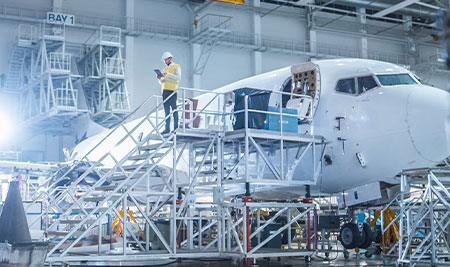
The UK aerospace sector is a cornerstone of the nation’s advanced manufacturing industry and a global leader in innovation, exporting technologies and supplying the civil, defence, and space markets worldwide. As the country navigates rapid technological change, sustainability goals, and post-pandemic recovery, the demand for aerospace engineers is set to soar toward 2030.
Industry Expansion
- The UK aerospace sector has seen robust growth, adding substantial value to the economy. Between 2010 and 2024, it expanded by 64%, reaching a contribution of £42 billion in 2024 alone.
- By 2030, the aerospace raw materials market is projected to rise from over £100 billion in 2023 to £150 billion, indicating significant growth and the need for increased manufacturing capacity and technological innovation.
- The transition to net zero is elevating demand for engineers skilled in developing advanced propulsion systems, lightweight materials, and clean technologies.
Shortage and Labour Gaps
- The Royal Academy of Engineering forecasts a shortage of 1.5 million engineers in the UK by 2030, with aerospace playing a crucial role within this shortage.
- Despite 90,000 new engineering graduates annually, the demand far exceeds supply, resulting in a highly competitive job market and rising salaries for engineering professionals.
- Labour shortages span all skill levels, from apprenticeships to senior engineering posts, challenging the sector to attract and retain talent.
Technological Transformations
- Emerging technologies such as electric and hybrid-electric propulsion, autonomous systems, advanced materials, additive manufacturing, and artificial intelligence are creating new opportunities and specializations within aerospace engineering.
- Urban air mobility, drones, and space technology expansion are set to generate entirely new job categories by 2030.
Employment Outlook
| Year | Direct Aerospace Jobs | Sector Revenue (£B) | Notable Trends |
|---|---|---|---|
| 2010 | - | 26.0 | - |
| 2023 | 108,000 | 27.0–42.0 | Recovery, export growth |
| 2024 | 108,000+ | 42.0 | Supply chain expansion |
| 2030* | 120,000+ est. | 150.0 est. | Major tech/green transformation |
*Projections; figures may vary as future policies, automation, and international trends interact.
Salary and Career Progression
- Aerospace engineers benefit from an average annual salary of £43,000, which is 45% higher than the UK average.
- Chartered and specialized engineers (e.g., in carbon capture, sustainable fuels) are seeing salary increases far above the national average as companies compete for top talent.
- Career advancement is accelerated for aerospace engineers entering the field now, with opportunities in high-responsibility positions and flexible working arrangements increasingly standard.
Specializations in High Demand
- Propulsion and power systems (including sustainable aviation fuel and electrification) Avionics and control systems Aircraft and spacecraft design Urban air mobility (eVTOL, drones) Manufacturing process innovation (additive manufacturing, smart factories) Space systems engineering
Government and Industry Response
- Substantial investments are being made to close the skills gap, including the Aerospace Growth Partnership’s focus on developing supply chain capabilities and sustainable technologies.
- Government and industry are collaborating to produce more engineers, with apprenticeships, retraining, and new educational Programmes emphasized.
Conclusion
The demand for aerospace engineers in the UK by 2030 will be exceptionally strong, driven by sector growth, unprecedented technological innovation, and global competition. The scale of forecasted investment and the scope of required skills point to a decade of opportunity for engineers entering or advancing within aerospace—one that will shape the country’s role in global aviation, defence, and spaceflight for years to come.


